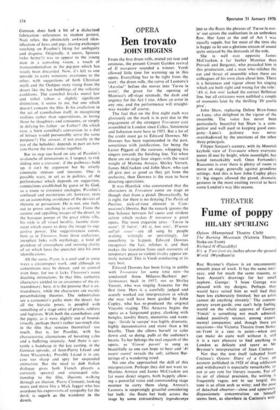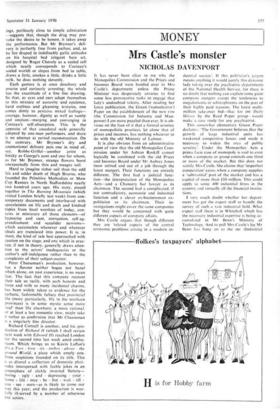THEATRE
Fume of poppy HILARY SPURLING Opium (Hampstead Theatre Club) The Burning Mountain (Victoria Theatre, Stoke-on-Trent) Richard II (Piccadilly) It's a Two-foot-six-inches-above-the-ground World (Wyndham's) Roc Brynner's Opium is an uncommonly smooth piece of work. It has the same intri- cacy, and for much the same reasons, as Jane Austen's drawings for her small nephew, George: `I hope George was pleased with my designs. Perhaps they would have suited him as well had they been less elaborately finished; but an artist cannot do anything slovenly.' The contem- porary avant-garde, one can't help feeling, would on the whole approve of George. `Finish' is something not much admired, indeed positively suspect, among experi- mental companies; and, though there are occasions—the Victoria Theatre from Stoke- on-Trent is a case in point—when one can make do quite well without it, still it is a rare pleasure to find anything in London as delicate and spare as Mr Brynner's interpretation of Jean Cocteau.
Not that the text itself (adapted from Cocteau's Opium: Diary of a Cure, an account published in 1928 of drug addiction and withdrawal) is especially remarkable, or not at any rate for literary reasons. For all its air of clinical precision, the writing is frequently vague, not to say turgid; the tone is as often arch as witty; and the pose of detached observer—close and apparently dispassionate concentration on himself seems here, as elsewhere in Cocteau's writ- ings, perilously close to simple admiration —suggests that, though the drug may pro- voke the desire to be honest, it takes away the performance. But Mr Brynner's deli- very is.perfectly free from pathos; and, as he lies draped in indefinably gallic attitudes on his hospital bed (elegant bare set, designed by Roger Chevely as a sealed cell which neatly corresponds to Cocteau's sealed world) or slopes from bed to table, draws a little, smokes a little, drinks a little milk, he does nothing slovenly.
Each gesture is at once desultory and precise and curiously arresting; the whole has the exactitude of a fine line drawing. So that, as eyes and ears adapt themselves to this mixture of austerity and opulence, hard outlines and gleaming textures, one comes dimly to perceive mixed feelings— courage, humour, dignity as well as vanity and unction—merging and converging in Cocteau's self-absorption. This is the opposite of that anecdotal style generally adopted by one-man performers, and there is no attempt at period reconstruction. On the contrary. Mr Brynner's dry and unemotional delivery puts one in mind of, say, Robbe-Grillet—another artist as finicky as George's aunt and one for whom, as for Mr Brynner, strange flowers burst unexpectedly from thin and meagre soil.
Hard to imagine richer soil than the odd life and odder death of Hugh Bourne, who founded the Primitive Methodists or Mow Cop Ranters in North Staffordshire nearly two hundred years ago. His story, pieced together in The Burning Mountain (which visited London -briefly last week) from con- temporary documents and interleaved with speculations on life and death and kindred topics from local worthies of today, con- tains in miniature all those elements—of hypocrisy and cant, corruption, self-ag- grandisement and squalider passions— which accumulate whenever and wherever ideals are translated into power. It is, in short, the kind of tale best approached with caution on the stage, and one which in prac- tice, if not in theory, generally draws atten- tion to the actors' inadequacies or the author's self-indulgence rather than to the complexity of their subject-matter.
Peter Cheeseman's production, however. has a flavour neither bogus nor banal which alone, on past experience, is no mean feat. The fact that this company recount their tale so racily, with such honesty and force and with so many incidental charms, has been widely taken as evidence for the pathetic, fashionable fallacy that provincial life (more particularly, life in the northern provinces) is in some mystic sense more 'real' than life elsewhere; a more rational. or at least a less romantic view, might take it rather as confirming that Mr Cheeseman is a singularly fine director.
Richard Cottrell is another, and his pro- duction of Richard II (which I shall review next week with Edward II) reached London for the second time last week amid enthu- siasm. Which brings us to Kevin Laffan's It's a Two - foot - six - inches - above - the ground World, a piece which amply con- firms suspicions founded on its title. This is as dismal a collection of domestic plati- tudes interspersed with feeble jokes in an atmosphere of slickly inverted flattery— boring - ugly - and - depressing - your home - life - may - be - but - wait - till you - see - ours—as is likely to come our way this year; and the production is woe- fully ill-served by a number of otherwise fine actors.



































 Previous page
Previous page